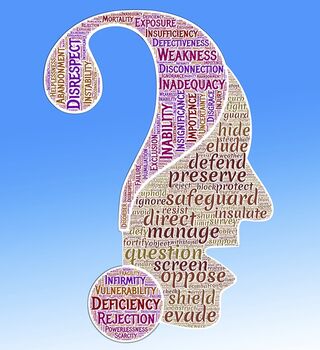Decision-Making
Living with Doubt: How to Make Peace with Uncertainty
The art of decision-making.
Posted February 17, 2022 Reviewed by Kaja Perina
Key points
- You can assess a person's trustworthiness by considering how they behaved when it was inexpedient for them to be honorable.
- An easy way to reduce doubt about purchases is to be thorough in reading online user reviews of the product or service.
- Rarely will decisions be perfect. It's wise to decide and then focus on enjoying it, even if there might have been a better choice.
- A reasonable rule of thumb: Moderate trust and moderate verification.

Certitude is comforting but elusive, and doubt can provoke anxiety. Consider this composite based on my clients, friends, and me.
I worry…about almost everything. Did I buy the right thing? Was I too tough or too nice? How hard should I work? How hard should I play? How much should I trust that person, even my wife?! Help!
Questions for someone plagued with doubt
You clearly are a thoughtful person but you're paying a price.
First of all, do you believe you’re, net, served, by your doubts? Or would you like to start doing a bit more reflection or research before making decisions, and then try to live with those decisions without undue revisiting?
Remember too that trust needn’t be binary: Often, you'll want to lean toward or lean away from pure trust depending on the situation and the person. Speaking of which, maybe it will be more helpful to consider questions about specific situations. Let’s take the ones you raised.
Let’s start with what may be the thorniest issue you raised: How much should you trust a given person, even your spouse? Well, what’s been the track record? When it has been inexpedient, to what extent has the person done what you’d hoped? For example, let's say that your wife could have hidden a big, very discretionary purchase but, before buying it, asked your opinion. And when you gave a reasonable explanation for why you thought she shouldn't buy it, she didn’t. Of course, that's evidence of some trustworthiness.
With regard to whether you bought the right thing, key to avoiding buyer’s remorse is to research it, for example, googling the name of the product and the word "reviews." Read the reviews and perhaps the product specs. Then, after you’ve bought it, try to accept that you've made at least a reasonable choice and focus on enjoying the product even if there might have been a wiser choice. That's true even of big purchases like a vacation, car, and even a home.
Were you too tough or too nice? Look at your track record. Has your erring on the side of kindness and mercy been wiser than being tough and fair? Or has your kindness resulted in being taken for granted or even their biting the hand that fed them, that is, you?
How hard should you work? Have you adequately considered how much good that would do compared with the liabilities? For example, let's say you’re a particularly effective psychotherapist choosing to see extra clients. You'd thereby do good and be psychologically and financially rewarded. But as a result, will you get too tired or alienate your romantic partner or children in excess of the benefits?
How hard should you play? Some people enjoy really getting into their recreation, for example, to always play their best and keep striving to get better. Other people view that as more work than recreation. Which feels right for you, at least for now? No long-term commitment required. Indeed, you can vary the intensity with your mood.
The takeaway
Life is filled with ambiguity and a thinking person can't help but often experience doubt. Perhaps the best we can do is to strive for balance. As Ronald Reagan said, “Trust but verify," and its Muslim equivalent, “Trust in Allah but tie your camel tight.” Or to use a different metaphor, as every trapeze artist knows, it’s wise to have a safety net but then, to get to the other side, you have to let go of the bar.
I read this aloud on YouTube


